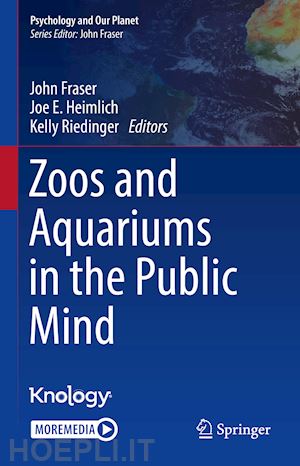
Questo prodotto usufruisce delle SPEDIZIONI GRATIS
selezionando l'opzione Corriere Veloce in fase di ordine.
Pagabile anche con Carta della cultura giovani e del merito, 18App Bonus Cultura e Carta del Docente
This book summarizes a range of psychological research into how zoos and aquariums operate in the minds of visitors and the broader public. Bringing together core findings from emerging international research, the book provides data-based summaries that situate the content in the larger context of how cultural institutions shape public understanding. The focus of this book is to bring into a single resource, the major strains of research that have explored how zoos and aquariums are situated in public consciousness, to ground the discourses around what zoos and aquariums do in the empirical data and evidence, and to find opportunities to summarize well-established fact to support future research expanding on the known.
Among the topics discussed:
Professional practitioners, zoo industry professionals, and business leaders will find this book an invaluable guide to the psychological literature surrounding the zoo industry.
Foreword.- 1. Established facts about how zoos and aquariums work in mental process.- 2. Trust and favorability.- 3. What is the STEM learning ecology and where do zoos and aquariums fit in it? Insights from a National Study of the Public’s Engagement with Science, Technology, Engineering, and Math.- 4. Basics of behavior change.- 5. Family talk at Live Animal Exhibits: From Biological to Ecological to Conservation Talk.- 6. Critical environmental literacy and the role of zoos and aquariums: A Radical Proposition.- 7. Can we nudge them? Conservation talk under different interpretive conditions.- 8. Social radiation of ideas from cultural institutions.- 9. Visitor behavior, choice, conservation conversations and meaning-making: Tracking visitor groups with GoPro Cameras.- 10. Visitor agendas and preconceptions about learning.- 11. Empathy development at zoos.- 12. Contributions to biodiversity awareness:An update on achieving Aichi target 1.
John Fraser, Ph.D. AIA is a conservation psychologist who has dedicated over 30 years to exploring the role of zoos and aquariums in society. He is President & CEO of Knology, a past president of the Society for Environment, Population, and Conservation Psychology, Editor of Curator: the Museum Journal, and editor of this book series.
Joe E. Heimlich, Ph.D. is Sr. Director for Research for the Center of Science and Industry (COSI) and a researcher in COSI’s Center for Research and Evaluation where he studies informal learning in zoos, nature centers, science centers, and other museums. He is also Professor Emeritus with Ohio State University.
Kelly Riedinger, Ph.D. is a Senior Researcher and program lead in informal, K-12 and connected learning for the STEM Research Center at Oregon State. Kelly has been involved in the zoo/aquarium field as a practitioner, researcher and evaluator for 20 years.











Il sito utilizza cookie ed altri strumenti di tracciamento che raccolgono informazioni dal dispositivo dell’utente. Oltre ai cookie tecnici ed analitici aggregati, strettamente necessari per il funzionamento di questo sito web, previo consenso dell’utente possono essere installati cookie di profilazione e marketing e cookie dei social media. Cliccando su “Accetto tutti i cookie” saranno attivate tutte le categorie di cookie. Per accettare solo deterninate categorie di cookie, cliccare invece su “Impostazioni cookie”. Chiudendo il banner o continuando a navigare saranno installati solo cookie tecnici. Per maggiori dettagli, consultare la Cookie Policy.